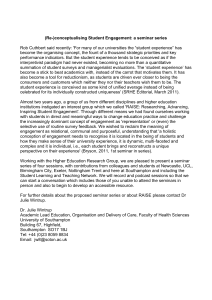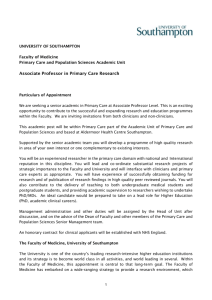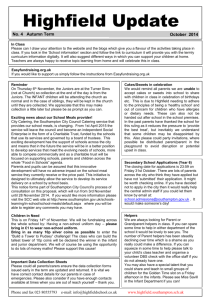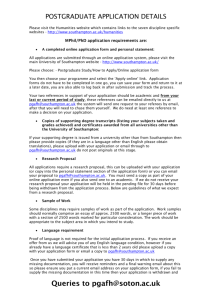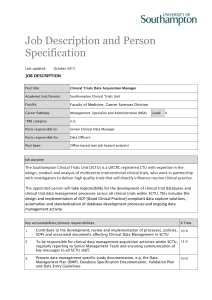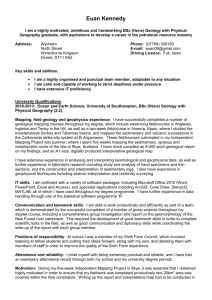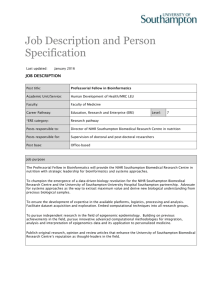Further particulars
advertisement
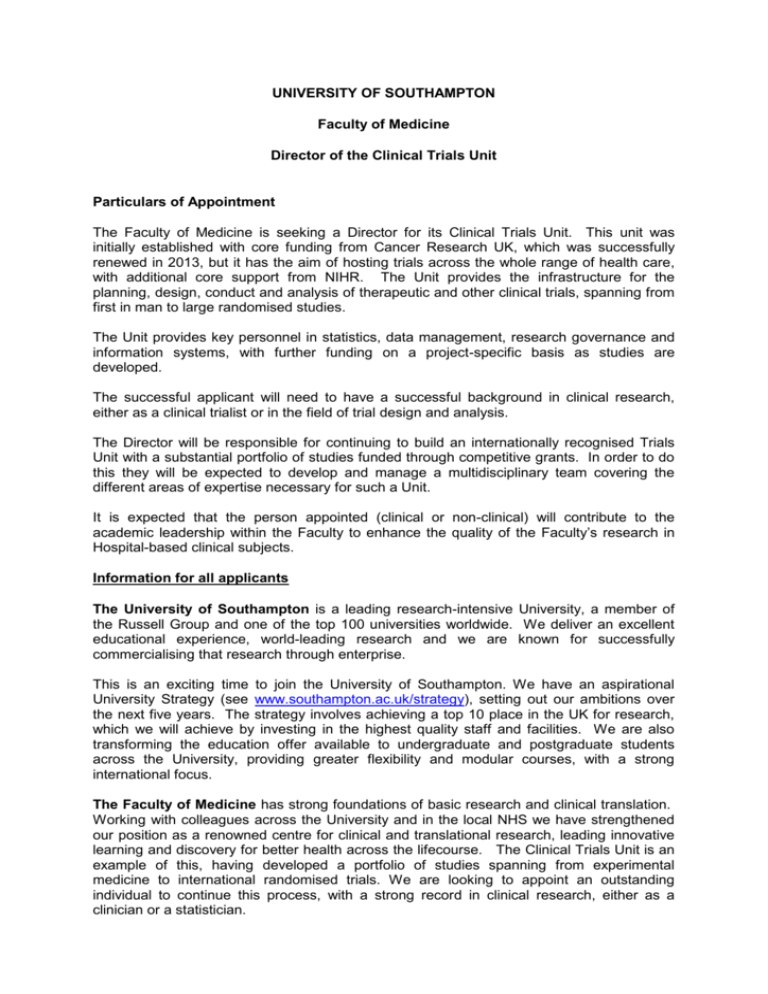
UNIVERSITY OF SOUTHAMPTON Faculty of Medicine Director of the Clinical Trials Unit Particulars of Appointment The Faculty of Medicine is seeking a Director for its Clinical Trials Unit. This unit was initially established with core funding from Cancer Research UK, which was successfully renewed in 2013, but it has the aim of hosting trials across the whole range of health care, with additional core support from NIHR. The Unit provides the infrastructure for the planning, design, conduct and analysis of therapeutic and other clinical trials, spanning from first in man to large randomised studies. The Unit provides key personnel in statistics, data management, research governance and information systems, with further funding on a project-specific basis as studies are developed. The successful applicant will need to have a successful background in clinical research, either as a clinical trialist or in the field of trial design and analysis. The Director will be responsible for continuing to build an internationally recognised Trials Unit with a substantial portfolio of studies funded through competitive grants. In order to do this they will be expected to develop and manage a multidisciplinary team covering the different areas of expertise necessary for such a Unit. It is expected that the person appointed (clinical or non-clinical) will contribute to the academic leadership within the Faculty to enhance the quality of the Faculty’s research in Hospital-based clinical subjects. Information for all applicants The University of Southampton is a leading research-intensive University, a member of the Russell Group and one of the top 100 universities worldwide. We deliver an excellent educational experience, world-leading research and we are known for successfully commercialising that research through enterprise. This is an exciting time to join the University of Southampton. We have an aspirational University Strategy (see www.southampton.ac.uk/strategy), setting out our ambitions over the next five years. The strategy involves achieving a top 10 place in the UK for research, which we will achieve by investing in the highest quality staff and facilities. We are also transforming the education offer available to undergraduate and postgraduate students across the University, providing greater flexibility and modular courses, with a strong international focus. The Faculty of Medicine has strong foundations of basic research and clinical translation. Working with colleagues across the University and in the local NHS we have strengthened our position as a renowned centre for clinical and translational research, leading innovative learning and discovery for better health across the lifecourse. The Clinical Trials Unit is an example of this, having developed a portfolio of studies spanning from experimental medicine to international randomised trials. We are looking to appoint an outstanding individual to continue this process, with a strong record in clinical research, either as a clinician or a statistician. Key to the success of the Faculty of Medicine is the delivery of high-quality education for undergraduate and postgraduate students, building on our partnership in biomedical research with Southampton University Hospitals NHS Trust and fostering new collaborations with the physical sciences, including chemistry, engineering and computing. The Director of the Clinical Trials Unit will play a key role in these developments. The Faculty of Medicine has a clear research strategy to investigate the biomedical basis of common human diseases and to translate this into clinical practice. The Faculty’s research is delivered through four Academic Units: Cancer Sciences Human Development and Health Clinical and Experimental Sciences Primary Care and Population Sciences All research is organised and managed by these Academic Units, each of which has clear evidence of international excellence. Each carries a significant degree of devolved responsibility for its research budgets and grants, space, equipment and personnel. The Clinical Trials Unit is managed as part of the Cancer Sciences Academic Unit, although its portfolio contains a number of trials in other areas of healthcare. Working in close partnership with University Hospital Southampton NHS Foundation Trust, translational research is delivered through the Southampton Centre for Biomedical Research, bringing together the Cancer Research UK/NIHR Experimental Cancer Medicine Centre, the Wellcome Trust Clinical Research Facility, the Southampton Clinical Trials Unit, the Wessex Investigational Sciences Hub, the NIHR Biomedical Research Centre for Nutrition and Lifestyle and the NIHR Biomedical Research Unit for respiratory medicine. The Cancer Sciences Academic Unit consists of over 200 scientists, clinicians and associated staff with a research budget in excess of £7m. Core funding to the Unit comes from programme grants from Cancer Research UK and the Leukaemia Research Fund, with major infrastructure support from the NIHR via the Experimental Cancer Medicine Centre and the Clinical Trials Unit. The mission of the Unit has always focused on bringing together the excellent clinical and basic research within the Faculty of Medicine and delivering high quality translational research for improving cancer treatment. The University of Southampton Clinical Trials Unit (UoSCTU) was formed in September 2006 with core funding from Cancer Research UK. Renewed core funding with an increased level of funding was granted following a quinquennial review of the trials unit previous and future activities submitted by Professor Eccles in 2012. The grant worth £2.3m supports key members of the senior team as well as some core administrative posts. The current funding period is from October 2013 to September 2018. Our cancer focus is currently around haemato-oncology, gastrointestinal, urological cancers with a particular interest in early phase studies in immunotherapy which complements the activities of the ECMC. The Unit also benefits from NIHR CTU support funding (annual funding calculated based on NIHR grant funding income) provides pump prime funding to establish stable capacity to increase high quality submissions through NETSCC funding streams. The Unit is gradually expanding activity in this area with large multicentre non-cancer IMP studies and a focus for non-IMP surgical studies. The Southampton Statistical Sciences Research Institute, known as S3RI, was set up by the University in August 2003 to support and co-ordinate the research activities of statisticians and demographers from the Schools of Social Science, Mathematics and Medicine. It involves more than 50 academic, research and support staff and makes up one of the largest groups of statisticians in UK universities. More than 35 research students are currently supervised by one or more members of S3RI. The mission of the Institute is to develop statistical research, including core statistical methodology and research motivated by applied problems, to disseminate developments to a wide range of users of statistics inthe sciences and government and to raise the national and international profile of statistical research at Southampton through co-ordination and support of research activities. The Southampton Centre for Biomedical Research (SCBR) lies at the core of the clinical and biomedical research partnership between the University Hospital Southampton NHS Foundation Trust and the University of Southampton. This body coordinates the people and resources of our major clinical research facilities, units and centres which are supported by £27m of National Institute for Health Research (NIHR) funded infrastructure. The Clinical Trials Unit sits within this overall structure, giving the Unit ready access to the expertise present in the statistics, epidemiology, public health and health economics groups. The Director of the UoSCTU is a member of the Operational and Management Group of the SCBR. The UoSCTU have recently enhanced a close working relationship with the South Central Research Design Service (RDS), the RDS (Director, Mark Mullee) provides expertise in statistical trial design, health economics and grant submission focusing on investigators developing proposals to submit to NIHR funding programmes. A jointly funded Senior Statistician post works between the CTU and RDS to develop new proposals where CTU support at some level is likely to be required. Teaching in the Faculty of Medicine. The Faculty of Medicine now has three pathways a medical degree, including the six year widening access’ programme where students enter a ‘year 0’ foundation year. The BM5 programme has a number of distinctive features. These include the integrated nature of the teaching courses during which the scientific disciplines are taught together in a clinical context using a systems-based approach, and the study-in-depth where students undertake an eight-month supervised research project. The BM4 programme also has a number of key features, including clinical topics in the first two years where they meet on a regular basis in Graduate Groups with or without a facilitator; learning is with BM5 students in the 3rd and 4th Years on all clinical attachments. All students take the same examinations. Both programmes provide substantial clinical experience in the first two years, student selected components, dispersed final year attachments and work shadowing prior to commencing as a PRHO, and inter-professional learning. The “New Generation Project” has developed a common learning programme of eight weeks which forms part of both BM, and also ten other health professional programmes. The Division of Medical Education consists of the Education Development Unit and the Centre for Learning Anatomical Sciences. The Education Development Unit has strong links with all other divisions to enable the promotion of high standards in teaching. The School regards the quality of its educational provision as one of its major strengths and so attaches great importance to the educational staff development programmes. The Southampton medical curriculum contains a number of innovative features, such as the blurring of the traditional distinction between the pre-clinical and clinical phases; placing a basic science examination at the end of the third year in order to encourage the reinforcement of systems course teaching during clinical attachments; study-in-depth and a regional final year. A recent review of Years 1 and 2 has resulted in an increased commitment to systems-based teaching. The Faculty regards the development of teaching skills as being of great importance and appropriate seminars and workshops are arranged by the Senior Lecturer in Medical Education, as part of the Faculty’s academic staff development programme. Information for clinical applicants For clinically qualified applicant an honorary consultant contract with University Hospital Southampton will be arranged and the post holder will be involved in clinical service delivery in their specialist area. UHS expects all medical and dental staff to work within the guidelines of the “General Medical Council Guide - Good Medical Practice”. Subject to the provisions of the Terms and Conditions of Service, the post-holder will be expected to observe the Trust's agreed policies and procedures, drawn up in consultation with the profession on clinical matters. In particular, where the post-holder manages employees of the Trust, he/she will be expected to follow the local and national employment and personnel policies and procedures. The post-holder will be expected to make sure that there are adequate arrangements for hospital staff involved in the care of his/her patients to be able to contact him/her when necessary. All medical and dental staff employed by the Trust are expected to comply with its Health and Safety Policy and procedures. The post-holder will be responsible for the training and supervision of junior medical staff that work with him/her and if so will devote time to this activity. If appropriate, the postholder will be named in the contracts of doctors in training grades as the person responsible for overseeing their training and as the initial source of advice to such doctors on their careers. Terms and Conditions of Appointment General Terms a) The dates of the appointment will be agreed with the successful applicant, but it is hoped to fill the post as soon as possible. b) The appointee will be required to observe the Charter, Statutes and Ordinances of the University and to carry out all orders and regulations of the Council. It should be noted that these regulations include a policy of no smoking at work which, with the exception of certain designated areas, prohibits smoking in most University buildings. c) The appointment will be made on a full-time or part-time basis and no other paid work may be undertaken without the permission of Head of School. Permission is not required for the occasional giving of lectures elsewhere and the publication of books and articles. The appointees may, during their tenure of office, accept appointments as examiners of candidates for degrees and diplomas at other institutions. (d) The appointment will be made on the basis of a permanent contract. General Duties and Hours of Work (a) The hours of work will be such as are necessary for the performance of the duties of the post. (b) The appointee is expected as an integral part of their duties, to engage in research and to further the prosecution of research in the University. (c) The appointee is also expected to participate in the teaching work and administration of the Department. This will include teaching and examining as required by the Regulations from time to time approved by the Senate and to do all in their power to promote the advancement of the study of their subjects and the welfare and corporate life of the University. As a member of the University the appointee may be required to serve on the Senate and the appropriate Faculty Boards according to the Statutes and Ordinances from time to time in force. Miscellaneous Terms and Conditions (a) The appointee will be expected to observe the letter and spirit of the University's Equal Opportunities Policy: The University of Southampton confirms its commitment to a comprehensive policy of equal opportunities in employment and for students in which individuals are selected and treated on the basis of their relevant merits and abilities and are given equal opportunities within the University. The aim of the policy is to ensure that no job applicant or employee, prospective student or students, should receive less favourable treatment on any grounds which are not relevant to good employment practice for staff or to academic ability and attainment for students. The University is committed to a programme of action to make the policy fully effective. The person appointed will be expected to work within the spirit and letter of the University's Equal Opportunities Policy. Holiday Full-time members of the academic staff are entitled to an annual holiday on full pay. The length of such holiday, which must normally be taken during University vacations, is in conformity with departmental custom and practice. Sick Leave The sick leave regulations applicable to the post will be those relating to members of the Academic and Related staff. A copy of these regulations will be sent to the successful candidate. Salary The salary attached to the post will be on the University Senior Lecturer/Professorial (clinical or non-clinical) pay scale. Salary payments are made in arrears in monthly instalments on the last working day of each calendar month by credit transfer direct to a bank account. Superannuation The person appointed will be eligible to join (or continue in membership of) the Universities Superannuation Scheme under which the member currently contributes 6.35% of salary. Under the provisions of the Social Security Act 1986 membership of the University's scheme cannot be compulsory and the person appointed will have the alternative options of joining (or continuing in membership of) the State Earnings Related pension Scheme (SERPS), or taking out a Personal Pension Scheme. A member of the Federated Superannuation Scheme for Universities on 1 April 1975 may remain in that Scheme. Subject to certain caveats, an Inland Revenue regulation was introduced in 1989 which effectively means that the salary upon which an employer can base pension contributions is limited. The sum increases annually for inflation and is currently £108,600.00. Thus, in general, earnings above this level do not count for pension. There are some exceptions within the rules, and in particular, they do not apply to those who were already in the scheme before 1989. Further information on pension arrangements will be sent to the successful applicants. Removal Expenses It is necessary that the person appointed shall live in or near Southampton. The University will be prepared to make a contribution towards (a) the costs of removing the household and personal effects of a person appointed from within the United Kingdom and (b) the legal costs incurred for the purchase of a house in or near Southampton. Details of the scheme will be made available to those candidates called for interview. Applications Please apply online; Informal enquiries are welcome and should be addressed to Professor Diana Eccles (d.m.eccles@soton.ac.uk) or Professor Peter Johnson, P.M.W.Johnson@soton.ac.uk Interviews are likely to be held during late February 2014
